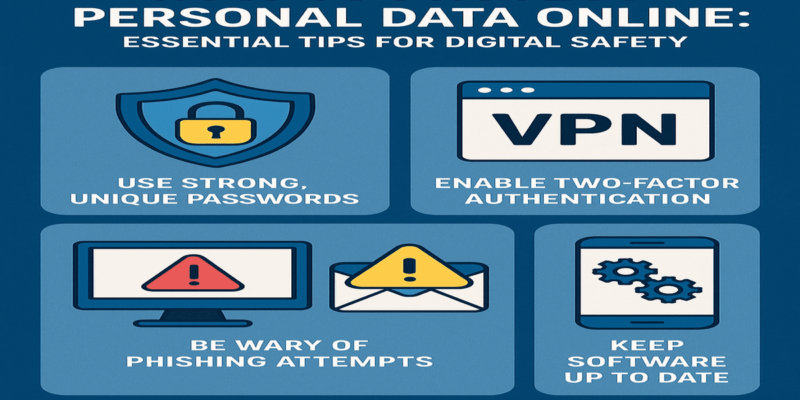Imagine this: You wake up, check your phone, and suddenly realize your bank account has been emptied. Terrifying, right? In today’s digital world, cybercriminals are constantly on the lookout for their next target. Protecting personal data online has now become a dire necessity.
Understanding the Risks
Every time you browse the web, shop online, or log in to social media, you leave behind digital footprints. Hackers, scammers, and data brokers thrive on this information. They use it for identity theft, financial fraud, and even selling your personal details to advertisers. But don’t worry! By following some smart cybersecurity tips, you can keep your information safe.
How to Protect Personal Data Online
Here’s a comprehensive breakdown on how to protect your personal data:
1. Strengthen Your Passwords
Your passwords are the first line of defense. Weak passwords are like leaving your front door wide open for thieves. Here’s how to create strong ones:
Use a mix of uppercase, lowercase, numbers, and symbols.
Avoid common passwords like ‘123456’ or ‘password’.
Use a password manager to generate and store complex passwords.
Enable two-factor authentication (2FA) wherever possible.
2. Be Wary of Phishing Scams
Phishing attacks trick you into revealing sensitive information. They often come in the form of emails or messages pretending to be from banks, online services, or even friends. Spot them by:
Checking for typos or strange email addresses.
Hovering over links before clicking to see where they lead.
Never sharing personal information through email or text messages.
3. Secure Your Devices and Networks
Your devices store a treasure trove of personal data. If left unprotected, they become easy targets. Here’s how to secure them:
Install antivirus software and keep it updated.
Regularly update your operating system and apps.
Avoid using public Wi-Fi for sensitive transactions unless you’re using a VPN.
Lock your phone and computer with strong passwords or biometric authentication.
4. Manage Social Media Privacy Settings
Social media platforms collect vast amounts of personal data. To limit exposure:
Adjust your privacy settings to restrict who can see your posts and personal details.
Avoid sharing sensitive information like your full birthdate, address, or travel plans.
Be cautious about friend requests from strangers. Fake accounts are everywhere.
5. Be Mindful of Online Shopping and Transactions
Shopping online is convenient, but it comes with risks. Cybercriminals create fake websites to steal payment information. Stay safe by:
Shopping only on secure websites (look for ‘https’ in the URL).
Using a virtual credit card or digital wallet for extra security.
Checking reviews before purchasing from lesser-known sites.
6. Keep an Eye on Your Digital Footprint
Your online activity leaves a trail that can be exploited. Reduce your digital footprint by:
Regularly reviewing and deleting old accounts you no longer use.
Using search engines like DuckDuckGo that prioritize privacy.
Opting out of data collection when possible.
7. Use Encrypted Messaging and Emails
Standard text messages and emails are vulnerable to interception. Protect your communication by:
Using end-to-end encrypted messaging apps like Signal or WhatsApp.
Encrypting emails with services like ProtonMail for sensitive conversations.
Avoiding sending personal or financial details over unprotected platforms.
8. Limit App Permissions
Many apps request access to unnecessary data, which can put your privacy at risk. Stay in control by:
Reviewing app permissions before installing them.
Disabling access to location, microphone, and contacts when not needed.
Deleting apps you no longer use to minimize data exposure.
9. Regularly Monitor Your Financial Statements
Identity theft often starts with small, unnoticed transactions. Keep an eye on your financial health by:
Regularly reviewing your bank and credit card statements for suspicious activity.
Setting up alerts for transactions over a certain amount.
Freezing your credit if you suspect fraudulent activity.
10. Stay Informed and Vigilant
Cyber threats are always evolving. Stay updated by:
Following cybersecurity blogs and news sources.
Attending workshops or online courses on digital privacy.
Encouraging family and friends to adopt safe online habits.
Final Thoughts on Protecting Personal Data Online
Protecting personal data online requires awareness and proactive measures. Cybercriminals are getting smarter, but so can you! By following these cybersecurity tips, practicing identity theft prevention, and prioritizing digital privacy, you can enjoy a safer online experience.
Your data is valuable. Treat it like it is!








